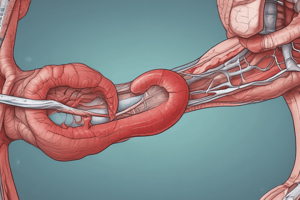Podcast
Questions and Answers
What clinical sign indicates elevated JVP in pulmonary embolism during deep inspiration?
What clinical sign indicates elevated JVP in pulmonary embolism during deep inspiration?
Kussmaul sign
What are the implications of decreased left ventricular end-diastolic volume (LVEDV)?
What are the implications of decreased left ventricular end-diastolic volume (LVEDV)?
Decreased LVEDV results in reduced cardiac output and blood pressure.
Name a significant cause of acute cor pulmonale.
Name a significant cause of acute cor pulmonale.
Massive pulmonary thromboembolism
What findings would suggest right ventricular failure in a patient?
What findings would suggest right ventricular failure in a patient?
What happens to coronary blood flow as a result of increased tension in the heart wall during acute cor pulmonale?
What happens to coronary blood flow as a result of increased tension in the heart wall during acute cor pulmonale?
In which condition is the McConnell sign observed?
In which condition is the McConnell sign observed?
What is a leading non-cardiogenic cause of cor pulmonale?
What is a leading non-cardiogenic cause of cor pulmonale?
Which heart sound alteration is associated with left ventricular failure?
Which heart sound alteration is associated with left ventricular failure?
What point score is assigned for blood in the sputum according to the clinical decision rule for pulmonary embolism?
What point score is assigned for blood in the sputum according to the clinical decision rule for pulmonary embolism?
What is the effect of decreased left ventricular cavity size on blood pressure?
What is the effect of decreased left ventricular cavity size on blood pressure?
Flashcards are hidden until you start studying
Study Notes
Elevated Jugular Venous Pressure (JVP)
- JVP typically decreases during inspiration
- In pulmonary embolism, JVP increases during deep inspiration, known as Kussmaul sign
Interventricular Septal Deviation
- This deviation can be observed in certain conditions
Decreased Left Ventricular End-Diastolic Volume (LVEDV) and Cardiac Output
- LVEDV decreases
- Cardiac output decreases
- Blood pressure decreases
- Mean arterial pressure falls
- Reduction in coronary blood flow
Causes of Cor Pulmonale
- Leading cause is hypoxia from chronic obstructive pulmonary disease (COPD)
- Primarily caused by smoking
- Refers to right ventricular failure due to non-cardiogenic causes
Acute Cor Pulmonale
- Caused by massive pulmonary thromboembolism (blood clots in the lungs)
- Other causes include:
- Amniotic embolism
- Bone cement embolism
- Hair embolism
- Fat embolism
- Sudden onset pulmonary artery hypertension
- Sudden right ventricular failure
Effects of Acute Cor Pulmonale
- Increased tension in the heart wall, compressing blood vessels, reducing coronary blood flow
- Leads to chest pain, impaired cardiac function
- Potential for cardiogenic shock
- Decreased coronary blood flow resulting in microinfarction in the right ventricle
- Elevated Troponin I, associated with elevated Heart Fatty acid binding protein
- Septal deviation:
- Inter-ventricular septum bulging into the cavity of the left ventricle.
- McConnell sign (indicating right ventricular hypokinesis)
- Changes in the heart's shape affecting its contractility
- Decreased left ventricle cavity size and blood pressure
Case Scenario
- A 75-year-old patient with bilateral total hip replacement surgery for avascular necrosis of the hip experienced dyspnea and chest pain on postoperative day 3.
- Vital signs:
- Heart rate (HR): 120 bpm
- Blood pressure (BP): 90/60 mmHg
- Jugular venous pressure (JVP): Elevated (Kussmaul sign)
- Physical examination:
- Loud S1
- Wide and fixed split S2 (suggestive of right ventricular failure)
- Presence of S3
- Lungs clear
- Diagnosis: Pulmonary thromboembolism (PE) suspected
Additional Heart Sound Information
- Narrow split S2: Left ventricular failure (LVF)
- Wide split S2: Right ventricular failure (RVF)
Clinical Decision Rule for Pulmonary Embolism (PE)
- Mnemonic: BDC-HIP
- Blood in the sputum: 1 point
Studying That Suits You
Use AI to generate personalized quizzes and flashcards to suit your learning preferences.




